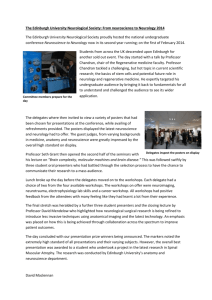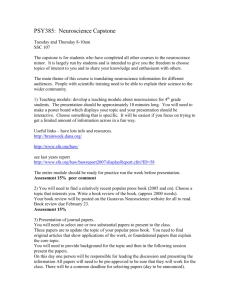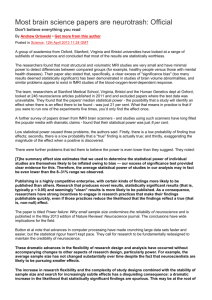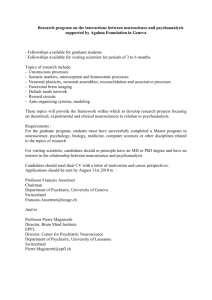1 Programme Title Clinical Neurology 2 Programme Code MEDT21
advertisement
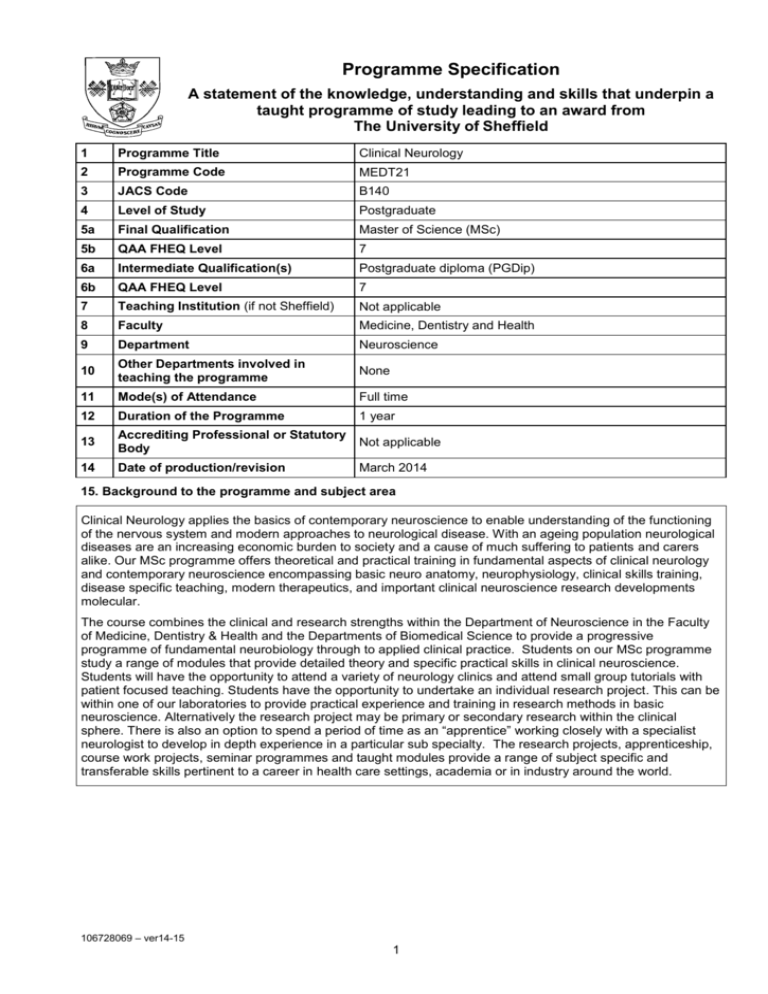
Programme Specification A statement of the knowledge, understanding and skills that underpin a taught programme of study leading to an award from The University of Sheffield 1 Programme Title Clinical Neurology 2 Programme Code MEDT21 3 JACS Code B140 4 Level of Study Postgraduate 5a Final Qualification Master of Science (MSc) 5b QAA FHEQ Level 7 6a Intermediate Qualification(s) Postgraduate diploma (PGDip) 6b QAA FHEQ Level 7 7 Teaching Institution (if not Sheffield) Not applicable 8 Faculty Medicine, Dentistry and Health 9 Department Neuroscience 10 Other Departments involved in teaching the programme None 11 Mode(s) of Attendance Full time 12 Duration of the Programme 1 year 13 Accrediting Professional or Statutory Body Not applicable 14 Date of production/revision March 2014 15. Background to the programme and subject area Clinical Neurology applies the basics of contemporary neuroscience to enable understanding of the functioning of the nervous system and modern approaches to neurological disease. With an ageing population neurological diseases are an increasing economic burden to society and a cause of much suffering to patients and carers alike. Our MSc programme offers theoretical and practical training in fundamental aspects of clinical neurology and contemporary neuroscience encompassing basic neuro anatomy, neurophysiology, clinical skills training, disease specific teaching, modern therapeutics, and important clinical neuroscience research developments molecular. The course combines the clinical and research strengths within the Department of Neuroscience in the Faculty of Medicine, Dentistry & Health and the Departments of Biomedical Science to provide a progressive programme of fundamental neurobiology through to applied clinical practice. Students on our MSc programme study a range of modules that provide detailed theory and specific practical skills in clinical neuroscience. Students will have the opportunity to attend a variety of neurology clinics and attend small group tutorials with patient focused teaching. Students have the opportunity to undertake an individual research project. This can be within one of our laboratories to provide practical experience and training in research methods in basic neuroscience. Alternatively the research project may be primary or secondary research within the clinical sphere. There is also an option to spend a period of time as an “apprentice” working closely with a specialist neurologist to develop in depth experience in a particular sub specialty. The research projects, apprenticeship, course work projects, seminar programmes and taught modules provide a range of subject specific and transferable skills pertinent to a career in health care settings, academia or in industry around the world. 106728069 – ver14-15 1 16. Programme aims 1. To enable students to develop independence of thought, intellectual curiosity and a critical approach to evidence, theories and concepts. 2. To provide stimulating and enjoyable teaching that is informed and invigorated by the research and scholarship of the staff. 3. To foster a commitment to continuing professional development and lifelong learning. 4. To train students to be able to form a differential diagnosis of neurological disease and propose a management plan based on knowledge of underlying pathobiological mechanisms and modern therapeutics. 5. To prepare students for further postgraduate work and/or a professional career in clinical neuroscience or other areas of biomedical practice through transferable skills. 17. Programme learning outcomes Knowledge and understanding: Candidates completing the programme will have: K1 An in-depth knowledge of key areas and topics in Clinical neuroscience. K2 An appreciation of the current and potential impact of neurological disease on society. K3 A detailed critical knowledge in the retrieval, interpretation, referencing and presentation of scientific information. K4 A critical understanding of hypothesis-driven research including experimental design, execution of experiments and analysis of outcomes ( MSc Research module only). K5 An in-depth knowledge of one key neurology sub-specialty (MSc apprenticeship module). Skills and other attributes: S1 Formulate relevant questions regarding the neuroanatomical and neuro biological basis underlying neurological disease. S2 Ability to formulate a differential diagnosis and management plan for key neurological diseases. S3 Retrieve, critically analyse, synthesize and summarise published information. S4 Demonstrate independent thought and judgement in relation to critical analysis of scientific literature and experimental data. S5 Analyse and interpret scientific data in a critical, objective manner. S6 Work in a safe, risk-free way, with consideration for others, taking due account of statuary requirements. S7 Demonstrate the ability to plan and execute scientific experiments using laboratory equipment and techniques commonly used in translational neuroscience (MSc research module only). 18. Teaching, learning and assessment Development of the learning outcomes is promoted through the following teaching and learning methods: The department of neuroscience fosters an environment that provides many opportunities for individual and group learning. However, the primary responsibility for learning lies with the student, who must be organised and selfmotivated to make the most of the programme. Theoretical information will be provided through lectures, seminars, practical demonstration classes and interactive tutorials. Students are also expected to undertake a significant amount of independent study using library and web-based resources. Students will have examinations in all four taught modules, with Neuroanatomy being in the format of a spotter and practical exam. Each student independently produces two critical review essays on original titles having done all background work necessary to write a comprehensive review (neurodegeneration and neuroanatomy modules). Students will independently create and present a scientific research poster to develop presentation skills. The student makes formal presentation reviewing a key question (CVA module) and in a presentation describing their research project. The latter is prepared with guidance from the supervisor. Practical skills are obtained through ward and clinic based teaching, neuroanatomy dissection classes, a research project which is carried out under the supervision of an experienced member of staff. The student will write a thesis on the research project with guidance from the supervisor. Tutorials, seminars and individual meetings with staff provide opportunities for discussion and feedback. 106728069 – ver14-15 2 The linkage between the main teaching, learning and assessment methods adopted for each outcome are tabulated below. x x x x x x x x x x x x K2 x x x x x x x x x x x x K3 x x x x x x x x x K4 x x x x x x K5 x x S1 x x S2 x x S3 x S4 x x x x x x x x x S5 S6 x S7 x x x x x x x x x x x x x x x x x x x x x x x x x Reflective log Viva voce Open book coursework Written exam Tutorials Problem Based Learning Lectures Ward/ Clinic teaching x Research dissertation (Masters only) K1 Oral presentation Assessment Research Project Teaching Practical classes Learning outcome x x x x x x x x x x x x x x Opportunities to demonstrate achievement of the learning outcomes are provided through the following assessment methods: Each of the 30 credit modules is assessed using a formal examinations (15 credits) and on-going assessments during the module (15 credits), including essays, viva voce and oral presentations. The examination papers consist of short-answers, MCQ’s, and essay questions, depending upon the nature of the material covered by each module. Learning outcomes are carefully matched to the method of assessment (e.g. oral presentation skills are assessed by two independent markers of the presentation). Students are well informed of the University’s attitude towards plagiarism. Assignments are all screened with plagiarism software. Plagiarism is punished according to the University’s rules. In the third semester the students have to select one of two 60 credit options out of: 1) A research project (with or without patient contact) and 2) Clinical Neurology Experiential Learning module (CNEL) The research project (60 credits) is assessed from the written dissertation and viva voce examination. The viva is an opportunity for the student to discuss/defend their dissertation and is used by the external examiner as a means of assessing the quality of the projects. The CNEL Module is assessed by means of a portfolio (30 credits) and a 6000 word dissertation (30 credits) on an aspect of the sub-specialty chosen for the apprenticeship. The portfolio will contain a reflective log, anonymised details of cases seen and work based assessments. Students will be expected to have covered a core sub-specialty spread of cases. The students will perform work based assessments (mini CEX and case based discussions). A minimum of 12 mini-CEX and 6 case based discussions will be expected. A 6000 word coursework essay will also be used to test in depth knowledge on a particular subject (30 credits). 106728069 – ver14-15 3 19. Reference points The learning outcomes have been developed to reflect the following points of reference: Subject Benchmark Statements http://www.qaa.ac.uk/AssuringStandardsAndQuality/subject-guidance/Pages/Subject-benchmarkstatements.aspx Framework for Higher Education Qualifications (2008) http://www.qaa.ac.uk/Publications/InformationAndGuidance/Pages/The-framework-for-higher-educationqualifications-in-England-Wales-and-Northern-Ireland.aspx University Strategic Plan http://www.sheffield.ac.uk/strategicplan Learning and Teaching Strategy (2011-16) http://www.shef.ac.uk/lets/strategy/lts11_16 Feedback from lecturers, students and external examiners on other MSc courses, including the MSc in Molecular Medicine, MSc in Translational Neuroscience 20. Programme structure and regulations All students complete two modules during the first semester: Cerebrovascular disease and disorders of consciousness Inflammation and disorders of the peripheral nervous system All students complete two modules during the second semester: Applied neuroanatomy and clinical neuroscience Neurodegeneration In the third semester, all students select one of the following modules. Option A: Research project (with or without patient contact Option B: Clinical Neurology Experiential Learning Module Option A is open to all students. Option B is available only to students who are qualified doctors. All students will need honorary contracts with Sheffield teaching hospitals NHS Foundation trust. This will be processed on starting the course. Students attaining 120 credits only will be awarded a Postgraduate Diploma [MEDT22] and on attainment of 90 credits a Postgraduate Certificate [MEDT24] Detailed information about the structure of programmes, regulations concerning assessment and progression and descriptions of individual modules are published in the University Calendar available on-line at http://www.shef.ac.uk/govern/calendar/regs.html. 21. Student development over the course of study The programme is designed so that students progressively achieve more advanced levels of learning and practice. In semester 1 and 2, students take four modules designed to ensure that all students, irrespective of their background, have a thorough knowledge of the fundamentals of neuroscience and the practice of clinical neurology. The course recruits students from medical, paraclinical and biological science backgrounds. Option A is tailored for students with a biological science background, allowing them to develop an in-depth knowledge of clinical neuroscience before embarking on a laboratory-based research project or secondary research such as a meta-analysis. Option B is aimed at students with a medical or paraclinical background who have previous professional experience of working with patients. 106728069 – ver14-15 4 22. Criteria for admission to the programme Detailed information regarding admission to programmes is available from the University’s On-Line Prospectus at http://www.shef.ac.uk/courses/. –II degree in appropriate subject after minimum of 3 years study or –MBChB or equivalent Additionally for Non UK –IELTS 7.0 Candidates will normally have a good (upper second class or better) degree or equivalent in a relevant biomedical subject. Candidates will also have an IELTS mean of 7.0 (with a minimum of 7.0 in listening and 6.0 in other components). The course also represents a career development opportunity for overseas medical graduates seeking to undertake PhD study. 23. Additional information Sheffield combines the advantages of a top quality University, an outstanding Student’s Union, a large city and a pleasant location adjacent to the Peak District National Park. Information on the wealth and breadth of Neuroscience teaching and research at the University of Sheffield can be found by browsing the following websites: http://www.shef.ac.uk/medicine/neuroscience This specification represents a concise statement about the main features of the programme and should be considered alongside other sources of information provided by the teaching department(s) and the University. In addition to programme specific information, further information about studying at The University of Sheffield can be accessed via our Student Services web site at http://www.shef.ac.uk/ssid. 106728069 – ver14-15 5

